According to GCV Analytics, in January, the number of corporate-backed deals from around the world stood at 302, up 5% from the 287 rounds from the same month last year. Investment value stood at $19.66bn in total estimated capital – comparable to the $20.18bn of January 2021. The US came first in the number of corporate-backed deals, hosting 120 rounds, while Japan was second with 32 and China third with 22.

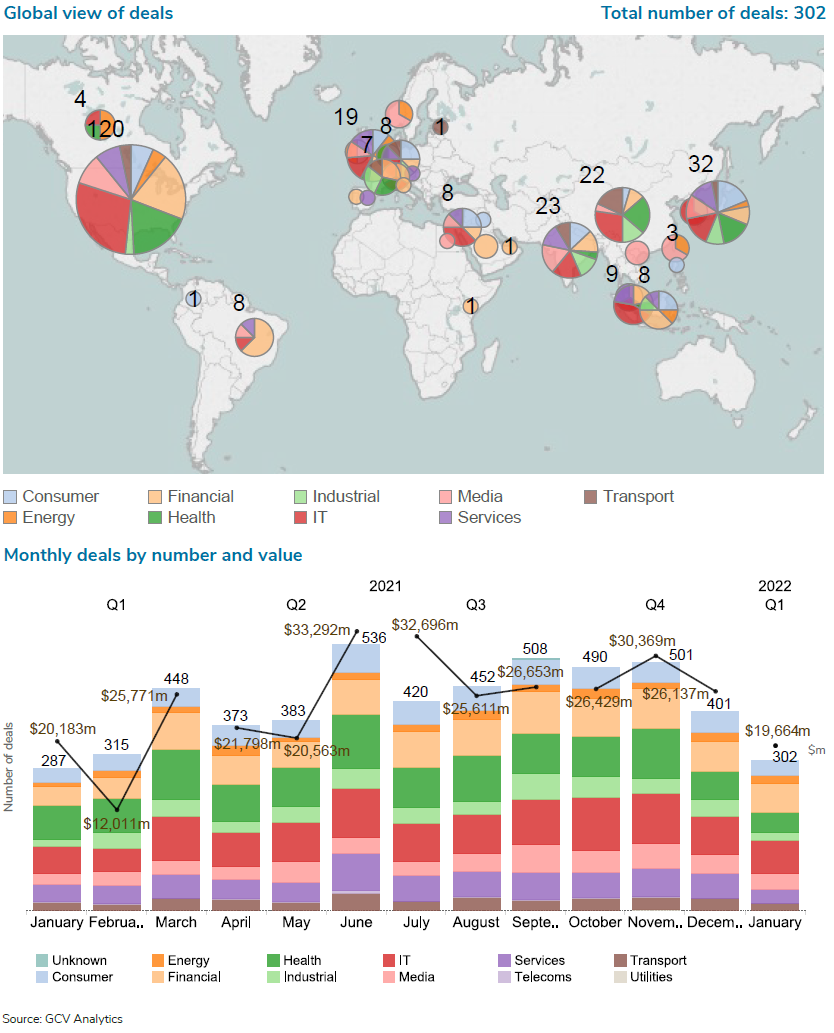
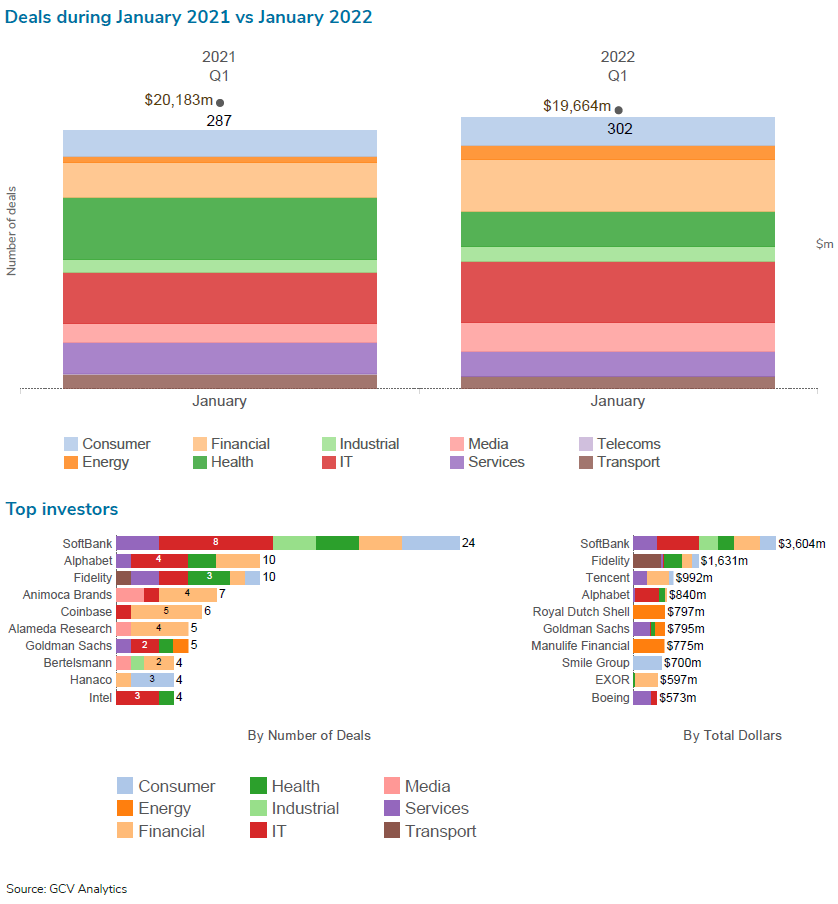
The leading corporate investors by number of deals were telecoms and internet conglomerate SoftBank, diversified internet conglomerate Alphabet as well as investment and financial services group Fidelity. In terms of involvement in the largest deals, Softbank, Fidelity and internet company Tencent were on the top of the list.
GCV Analytics reported 32 corporate-backed funding initiatives, including VC funds, new venturing units, incubators, accelerators and other. This figure was 39% higher than the one from January 2021, which had registered 23 such initiatives. The estimated capital stood at $3.17bn, nearly double the $1.59bn from the same month last year.
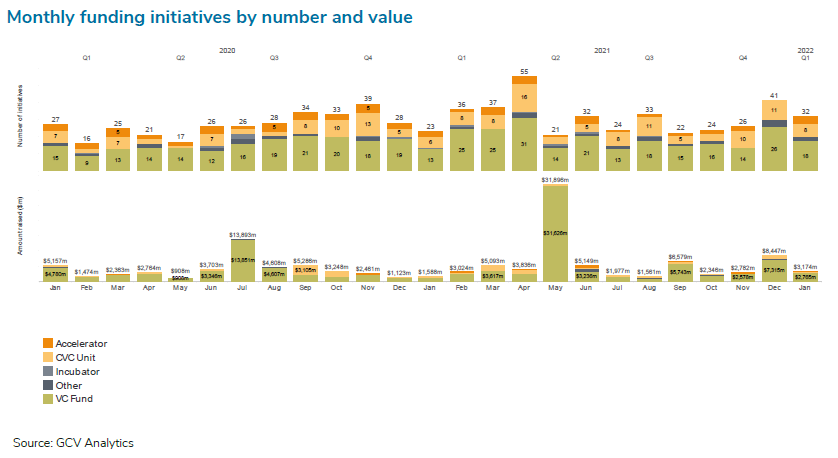
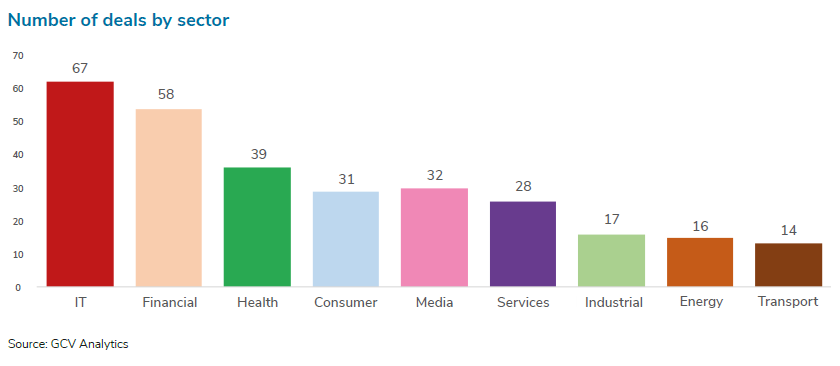
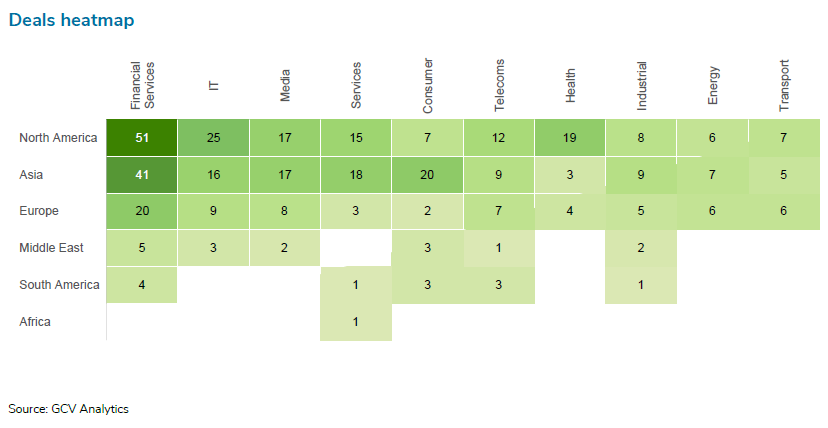
Deals
Emerging businesses from the health, IT, financial, health and consumer sectors led in raising the largest number of rounds in first month of 2022. The most active corporate venturers came from the financial, IT, media and services sectors, as shown on the heatmap.
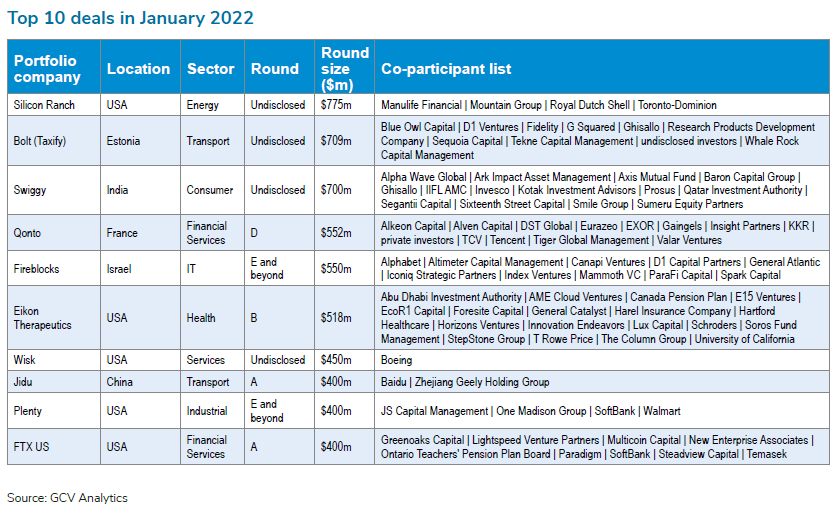
US-headquartered solar power producer Silicon Ranch Corporation secured $775m in an equity funding round led by insurance firm Manulife’s Investment Management vehicle, part of a resurgence in funding in the sector. Manulife Investment Management put up $400m for the round, which included oil and gas supplier Shell, investment manager TD Asset Management’s TD Greystone Infrastructure Fund and venture capital firm Mountain Group Partners. Silicon Ranch functions as the solar branch of Shell’s power distribution arm, Shell Energy, and runs a portfolio of solar farms and large-scale utility solar plants, on behalf of large businesses and governmental facilities. The company’s solar and energy storage projects run to 4 GW across North America and the capital will support the fulfilment of its project pipeline as well as an expansion into new markets and potential strategic investments.
Estonia-based ride hailing services provider Bolt raised €628m ($709m) in Series F funding round, led by Fidelity Management & Research and Sequoia Capital. The transaction reportedly valued the company’s pre-money €6.77bn ($8.4bn) pre-money valuation. G Squared, Ghisallo, Whale Rock Capital Management, Blue Owl Capital, D1 Capital Partners, Tekne Capital Management, CSVE Ventures, and other undisclosed investors also participated in the round. The fresh funds will help the company to continue expanding into new geographies and bring more consumers and partners. Founded in 2013 as Taxify, Bolt has developed an on-demand transportation platform that enables its users to book a variety of vehicles online, giving them access to affordable and accessible ride-hailing, micro-mobility and food delivery alternatives.
India-based food ordering service Swiggy secured $700m in a series K round featuring internet groups Prosus and Smile Group. Investment firm Invesco led the round, participating alongside financial services firms India Infoline and Kotak as well as Baron Capital Group, Sumeru Venture, Axis Growth, Sixteenth Street Capital, Ghisallo, Segantii Capital, Alpha Wave Global, Qatar Investment Authority and Ark Impact. Prosus and India Infoline were represented by Prosus Ventures and IIFL AMC Late Stake Tech Fund respectively, and the round valued the company at $10.7bn. Founded in 2014, Swiggy provides a machine learning-equipped on-demand delivery platform that enables users to order food from hundreds of thousands of local restaurants across some 500 Indian cities. It has more than 5,000 employees and 200,000 on-the-road delivery staff members.
France-based business-focused digital bank Qonto secured €486m ($552m) in a series D round that featured Tencent and valued it at $5bn. The round was co-led by Tiger Global Management and TCV and also featured Exor Seeds – on behalf of diversified holding company Exor – as well as Alkeon, Eurazeo, KKR, Insight Partners, Valar, Alven, DST Global, Gaingels and private investors Guillaume Pousaz and Ashley Flucas. Founded in 2016, Qonto has built a platform that enables small and medium-sized businesses and freelancers to maintain an online account and manage their finances in a more streamlined fashion. Some 65,000 businesses use the service, which allows them to secure specialised credit cards and integrate the account with their existing finance and bookkeeping tools.
US-based asset transfer infrastructure operator Fireblocks raised $550m in series E funding from investors including Alphabet’s CapitalG unit, at a time when more traditional banks are looking into cryptocurrencies. Investment group D1 Capital Partners and venture capital firm Spark Capital co-led the round, which included General Atlantic, Index Ventures, Mammoth, Altimeter Capital, Iconiq Strategic Partners, Canapi Ventures and Parafi Growth Fund. Founded in 2018, Fireblocks operates a secure multi-party computation-equipped cryptocurrency platform that helps enterprise users make digital transactions quickly and safely. The round lifted its total funding to $1bn and its valuation to $8bn, making it the world’s most valuable digital asset network operator, it said. The cash will be used to double the size of Fireblock’s 300-strong team by the end of this year, placing emphasis on engineers and customer service technicians. In addition, it plans to expand beyond the US, Europe and Asia-Pacific markets into Southeast Asia, Eastern Europe and Africa.
Eikon Therapeutics, a US-based drug discovery and development company co-founded by University of California (UC), Berkeley researchers, completed a $517.8m series B round from investors including UC Investments. Insurance provider Harel Insurance took part in the round, as did T Rowe Price Associates, Canada Pension Plan Investment Board, EcoR1 Capital, StepStone Group, Soros Capital, Schroders Capital, General Catalyst, E15 VC and Hartford HealthCare Endowment. Abu Dhabi Investment Authority’s ADIA subsidiary and AME Cloud Ventures were also among the investors, as were existing shareholders Column Group, Foresite Capital, Innovation Endeavors, Lux Capital, and Horizons Ventures. Founded in 2019, Eikon Therapeutics is building on super-resolution microscopy that enables the precise characterisation of protein interactions in living cells – offering a much more comprehensive insight than the static snapshots of frozen materials that are currently used. Eikon plans to focus on previously undruggable targets, though it has not revealed details yet.
Aerospace manufacturer Boeing invested $450m in US-based flying taxi developer Wisk, highlighting the interest from the industry in commercially viable vertical take-off and landing (VTOL) vehicles. Founded in 2010 as Zee Aero, Wisk is working on automated electric VTOL (eVTOL) technology and is currently in the process of building its sixth generation machine. Zee Aero was acquired by Kitty Hawk Corporation in 2017 and Wisk was formed as a joint venture with Boeing in 2019. In contrast to other companies working on VTOL technology, Wisk is going straight to automated vehicles as opposed to human-operated taxis. Automation, the logic goes, is the best way for the industry to scale, as it means operating costs will be lower along with the resulting prices.
Internet group Baidu and carmaker Zhejiang Geely Holding Group provided $400m in series A funding for their China-based electric vehicle (EV) joint venture, Jidu. Baidu now owns a 55% stake in Jidu while Geely reportedly holds the remainder. Baidu had first revealed in January 2021 that it would form a smart EV-focused company with Geely. Incubated in March 2021 with $300m, Jidu is working on an artificial intelligence-enhanced autonomous EV system equipped with machine learning algorithms that help improve its self-driving capabilities. The series A money will go toward research and development (R&D) efforts and mass production of the company’s products due to begin next year. Its first concept car model is set to be released at the upcoming Beijing Auto Show in April 2022.
US-based urban farm service Plenty Unlimited raised $400m in series E funding from investors including big-box retailer Walmart and internet and telecoms firm SoftBank, as the latter continues to invest in the space. Investment firms One Madison Group and JS Capital co-led the round, which represents the largest yet for an indoor farming technology company, according to Plenty, while SoftBank took part through its Vision Fund 1. Founded in 2013, Plenty is working with a network of indoor vertical farms to produce sustainable vegetables that do not contain pesticides and which are not genetically modified. The produce is delivered locally in California, where the company is headquartered, though it maintains a research facility in the state of Wyoming. The money will be used to improve Plenty’s software platform, which helps farms sell their crops directly to retail partners.
FTX US, part of Bahamas-registered cryptocurrency marketplace operator FTX Trading, raised $400m in a series A round featuring SoftBank’s Vision Fund 2 at an $8bn valuation. Other investors in the round, which marked the subsidiary’s first external funding, included Temasek, Multicoin Capital, Paradigm, Ontatio Teachers’ Pension Plan, Greenoaks Capital, Steadview Capital, New Enterprise Associates and Lightspeed Venture Partners. The funding will be used to grow the user base of FTX US, launch new business lines and further develop its derivatives products as it seeks to become the largest crypto exchange in the United States, having entered the market in May 2020, a year after parent company FTX Trading was founded.
Exits
GCV Analytics tracked 37 exits involving corporate venturers as either acquirers or exiting investors in January. The transactions included 30 acquisitions, two stakes sales, two initial public offerings (IPOs), two other transactions and one merger of equals.
The exit count was comparable to the January 2021 figure (38). The total estimated exited capital stood at $1.25bn, considerably smaller than the $7.16bn from same month from last year.

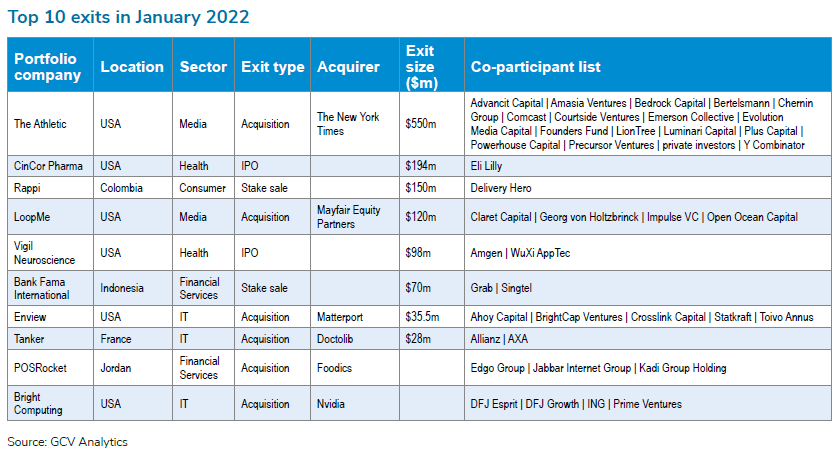
Media company The New York Times agreed to purchase US-headquartered online sports media platform The Athletic in a $550m deal, allowing media group Bertelsmann and mass media company Comcast to exit. The transaction represents a profitable exit for all the company’s investors and marks a contrast with the fortunes of the previous wave of digital media companies, which focused on a free-to-read business model and which have seen their valuations decline in recent years. Founded in 2016, The Athletic oversees a subscription-based online platform covering a range of sports using experienced journalists familiar with specific regional sports markets. In theory, this makes it easier for them to form in-depth contacts and focus on news applicable to fans of specific teams. The company has 1.2 million subscribers internationally and will boost the offering of New York Times, which has 8 million subscribers of its own. It remains one of the most widely read dailies in the world and increased its net profit 63% year on year to $54.7m in Q3 2021.
CinCor Pharma, a US-based developer of drugs for cardio-renal diseases, raised almost $194m in an IPO on the Nasdaq Global Market enabling pharmaceutical firm Eli Lilly to exit. It priced 12.1 million shares at $16.00 each, in the middle of the $15 to $17 range, and they have since fallen to $13.95, valuing it at $510m. CinCor had raised a total of $193m as of a $143m series B round in October 2021 featuring Eli Lilly vehicle Lilly Asia Ventures. Founded in 2018, CinCor specialises in developing treatments for diseases affecting the heart and kidneys. The capital will be used to further develop its aldosterone synthase product drug candidate, CIN-107, designed to treat high blood pressure, chronic kidney disease (CKD) and primary aldosteronism. The capital will also help advance the existing phase 2 trials of brigHTN – a prospective drug treatment for resistant hypertension – as well as to carry out phase 2 clinical trials on the candidate.
Local food delivery service provider Delivery Hero sold $150m of shares in Colombia-based delivery service Rappi as food delivery services continue to grow around the world. The divestment took place over a serious of transactions, which retained a 7.9% stake in Rappi on a fully diluted basis, worth over $400m based on the $5.25bn valuation for its $500m series F round in July 2021. Delivery Hero said the $150m is close to the total amount of capital it has invested in Rappi. Founded in 2015, Rappi operates a delivery app that operates across 250 cities in nine countries in Latin America, delivering groceries, medicine and consumer electronics in addition to food. The online food delivery market has been thriving in Latin America in recent years, particularly since the onset of the covid-19 pandemic caused a spike in demand, growing by more than 30% between 2019 and 2020, according to Statista.
UK-based mobile advertising platform LoopMe, previously backed by Holztbrinck Ventures, entered into a definitive agreement to be acquired by Mayfair Equity Partners through a $120m leveraged buyout. The transaction valued the company at $200m. The proceeds from it will be used to accelerate the company’s growth in its core markets such as the United States while expanding into new geographies, including Japan. Founded in 2012, LoopMe has developed a platform that works with all mobile video ad formats, including pre-roll, full screen and native video, and uses artificial intelligence and big data to improve engagement rates. The company had previously opened offices in Berlin and Paris.
US-based neurodegenerative disease drug developer Vigil Neuroscience floated in an $98m IPO on the Nasdaq Global Market, marking a potential exit for pharmaceutical firm Amgen. The company sold a total of 7,000,000 shares at a price of $14 per share. After the offering, there was a total of 28.26 million outstanding shares (excluding over-allotment option) priced at $14 per share, giving a market capitalisation of roughly $396m. Underwriters were granted an option to purchase up to an additional 1,050,000 shares from the company. Founded in 2020, Vigil Neuroscience uses microglia, the main active immune cells in the central nervous system, as the basis for drugs intended to target and treat neurodegenerative diseases. It has set a $100m placeholder target for the offering. Any proceeds from the IPO will go toward the development of the company’s line of monoclonal antibodies, VGL101, to treat adult-onset leukoencephalopathy with axonal spheroids and pigmented glia (ALSP) – a progressive disease affecting the brain and spinal cord.
Telecommunications firm Singtel and ride hailing app operator Grab each invested Rp 500bn ($35m) in Bank Fama International, an Indonesia-based digital bank owned by media group Emtek. The corporates both acquired 2.4 billion shares from Bank Fama equating to a 16.3% stake each. Emtek’s Elang Media Visitama unit had agreed to acquire the company in November 2021, and the latest deal reduced its stake from 93% to 62.8%. Founded in 1993, Bank Fama operates a digital consumer bank through a network of offices across the Indonesian cities of Bandung, Jakarta and Tangerang. It focuses on retail customers such as small and medium-sized enterprises. Singtel and Grab had joined forces to apply to Singapore’s Monetary Authority for a digital full bank licence which was granted in December 2020, before the two obtained another similar permit from Malaysia’s central bank seven months later.
Spatial data technology producer Matterport closed the purchase of Enview, a US-based 3D automation software provider backed by power producer Statkraft, for $35.5m in cash and 1.59 million shares. Enview had secured a total of $18m as of a $12m round in May 2020 led by BrightCap Ventures that included Statkraft unit Statkraft Ventures, Ahoy Capital, Crosslink Capital and Toivo Annus. Founded in 2015, Enview has created a software platform that uses artificial intelligence to process 3D geospatial data at high speeds.
Medical administration software provider Doctolib acquired France-based medical data protection technology provider Tanker in a stock and cash transaction reportedly sized between $28m and $34m. The deal marked an exit for insurance groups Axa and Allianz, both of which invested in a $7.2m round for the company in 2017 through respective subsidiaries Axa Strategic Ventures and InnovAllianz, bringing its total funding to $8.8m. Founded in 2015, Tanker has built an end-to-end encryption and key management platform for developers of software-as-a-service (SaaS) packages. The coding can be embedded in each SaaS development kit, removing the need for a standalone approach.
Internet company Jabbar Internet Group, energy services provider Edgo and diversified holding company Kadi Group Holding have exited Jordan-based point-of-sale software provider POSRocket in an acquisition of undisclosed size by restaurant technology producer Foodics that was disclosed. Founded in 2016, POSRocket has developed a cloud-based point of sales device designed to help clients in managing and growing their businesses by replacing traditional cash registers. The company’s device assists managers in optimising their manpower resources, regulating inventory stocks, generating different types of sales reports and monitoring all the operations in real-time from anywhere in the world.
Financial services firm ING exited Bright Computing, a Netherlands-based developer of high-performance computing technology, in an acquisition of undisclosed size by graphics chip producer Nvidia. ING’s Corporate Investments unit had invested an undisclosed amount in the company in 2010 and returned four years later for a $14.5m series B round co-led by DFJ and DFJ Esprit that included Prime Ventures. Founded in 2009, Bright Computing has developed a cluster management software designed to automate the process of building and managing Linux clusters. The company’s software helps to monitor and build clusters of different sizes and engages in the distribution of data centres provisioning, enabling clients to reduce the risk of cluster failure.
Note: Monthly data can fluctuate as additional data is reported after each issue of GCV magazine goes to press
